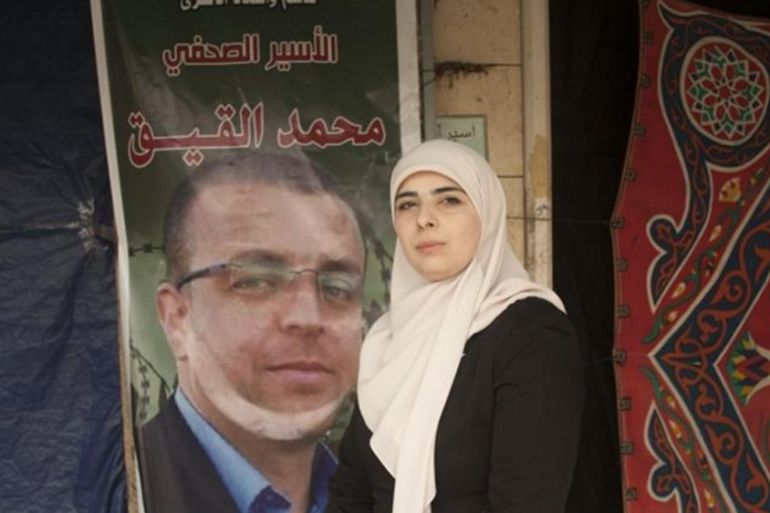Profile: Palestinian journalist Mohammed al-Qeeq
Qeeq conducted 94-day hunger strike in protest against the conditions of his detention by Israeli authorities.

Mohammed al-Qeeq, the Palestinian activist and journalist, has ended his three-month hunger strike and will be released in three months.
The family of Qeeq, who worked for a Saudi media outlet, announced on Friday that he was ending his 94-day fast.
Keep reading
list of 4 itemsFrance blames Azerbaijan for New Caledonia violence: Unpacking their spat
‘Hell on Earth’ as violence escalates in Sudan’s el-Fasher
South Korean military says North Korea test-fired ‘ballistic missiles’
Under a deal with Israel, he will remain in custody until May 21, but his “administrative detention” will not be renewed after that.
The 33-year old journalist was arrested on November 21, 2015. Four days later, Qeeq conducted the hunger strike in protest against the conditions of his detention. He wanted the Israeli military to either charge or release him from the military detention centre where he was being held.
Q&A: Jailed Palestinian man to be ‘either free or dead’
Qeeq graduated with a bachelor’s degree in journalism and returned to Birzeit University, where he was elected head of the student council and graduated with a Masters in Contemporary Arab Studies.
He worked as a news reporter with the Saudi-owned television network Al Majd. The Israeli intelligence service, the Shin Bet, alleged that he had incited violence and was involved in “terrorist activities” linked to Hamas, although any intelligence supporting the claim remains classified and the allegations never materialised in the form of criminal charges.
He had previously been jailed on three occasions for activities linking him to Hamas. In 2003, he spent a month in prison and the following year he was jailed for 13 months. In 2008, Qeeq was jailed for 16 months on charges relating to his activities on the student council at Birzeit University.
|
|
Last December, Qeeq was informed that the Israelis had issued an “administrative detention” order against him.
The controversial Israeli policy permits prisoners to be held for renewable six-month periods without charge or trial for an indefinite period.
“Administrative detention” is routinely used by Israeli authorities against Palestinians but it is only considered lawful in exceptional cases and as a last resort only.
Thousands of Palestinians have been detained in this manner over the years.
At least 660 Palestinian prisoners are currently being held in Israeli prisons without charge, according to the Palestinian prisoner support and human rights NGO Addameer.
The day after Qeeq received the administrative detention order, he was transferred to Ramle prison after his health deteriorated. Twelve days later he was transferred again, this time to a hospital in Afula, Israel.
The journalist was forcibly treated on January 10 when a medical team at Afula hospital administered salts and minerals via an IV for four continuous days, according to a lawyer who visited Qeeq at the time.
Lawyers for Qeeq lost their initial case demanding his release at the Israeli high court on January 27. The same court ordered a “suspension” of the detention order on February 4 due to Qeeq’s deteriorating condition.
READ MORE: Palestinian hunger strikes: ‘My husband is dying’
On February 15, the court rejected his demand that he be released and permitted to travel to a hospital in Ramallah on the West Bank. The court offered to transfer Qeeq to a hospital in occupied east Jerusalem, but he refused the deal.
The medical team rejected further calls from the hospital’s ethics committee to forcibly treat the prisoner, in accordance with Qeeq’s demands not to be treated or receive any medical examination.
“His arrest was very difficult because he was snatched from his family and children at dawn in a barbaric way by smashing down the door to our house,” his wife said.
“He was detained and taken to an unknown location. His arrest turned our lives upside down and we’ve lived in fear and tension because of it.”